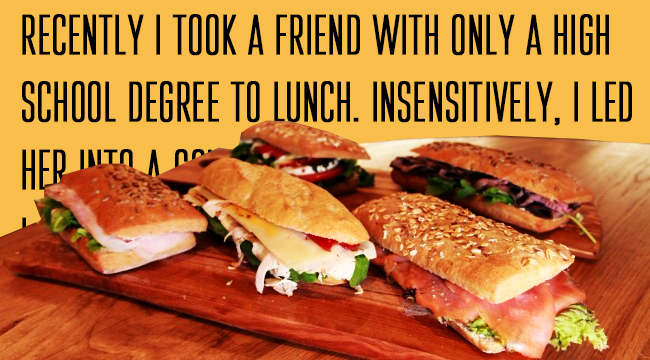
On Tuesday morning, New York Times writer David Brooks published a column in which he discussed the class boundaries between the upper middle class and the lower classes. Specifically, he claims that people in the upper middle class (which he pretty much equates to being college-educated, a problem in and of itself) are creating language, cultural, and residency barriers specifically to restrict and leave out those of lower income and education levels.
Not everything Brooks says is off-base. Certainly, there are major class divisions in our country, and one can claim (I certainly would) that there is a concerted effort by the wealthy to keep it that way. He brings up, for example, school district zoning, which is often set up to keep more affluent kids in certain schools and underserved kids in schools with less resources. But the problem with his piece (amongst many) is that it comes from such a privileged, tone deaf place that it just feels like a steaming pile of condescension.
In particular, this anecdote is making people furious:
Recently I took a friend with only a high school degree to lunch. Insensitively, I led her into a gourmet sandwich shop. Suddenly I saw her face freeze up as she was confronted with sandwiches named “Padrino” and “Pomodoro” and ingredients like soppressata, capicollo and a striata baguette. I quickly asked her if she wanted to go somewhere else and she anxiously nodded yes and we ate Mexican.
There is so much wrong with this story as a means to prove his point. His condescending tone (I, insensitively, brought my poor stupid, high school educated friend to a fancy sandwich shop. I should have known the poor, simple girl couldn’t handle my world, with its many types of ham. Why, the password to get in to the shop is a recitation of the entire first chapter of Infinite Jest — and I don’t even know if she can read!), the reading of her displeasure with his lunch choice as confusion or embarrassment (maybe she didn’t want to spend $24 on a sandwich and found the place really douchey?), and the racist implication that Mexican food was the obvious alternative to high class, gourmet dining. (And it’s a diploma, David Brooks. People who graduate from high school don’t earn a degree. How did you not know that?)
It’s all really offensive, and for an “educated” man, a particularly bad example to prove his thesis. Sandwich ingredients in Italian shops are not a good argument for how the upper middle class creates invisible barriers to keep others down. At all. Of course, the internet has glommed onto this terrible anecdote and is having a bit of a field day.
BREAKING NEWS! #DavidBrooks has a friend! World is stunned to learn that anyone would want to have lunch with him! Is it #JaydenKSmith? READ pic.twitter.com/BwVChpyLHS
— Stephen Simpson 🇺🇸 🇺🇦 🇮🇱 ProperGander (@BamaStephen) July 11, 2017
https://twitter.com/rshackelford14/status/884803847507644416
Just had a good Mexican lunch with my old friend David Brooks. Now to take a big sip of coffee and log into twitter
— Big Supernaturals (@UweBollocks) July 11, 2017
I ordered the tacos because I didn't know how to pronounce Chalupa
— Big Supernaturals (@UweBollocks) July 11, 2017
Coincidentally, when I was in college, I used to really enjoy David Brooks's columns, which is to say when I only had a high school degree.
— Matt Fuller (@MEPFuller) July 11, 2017
Everyone can go home.
This David Brooks spoof quote wins the internet today.
h/t @SimonMaloy pic.twitter.com/hsMTT8FfEl— Holly Figueroa O'Reilly 🌸 (@AynRandPaulRyan) July 11, 2017
Someone should tell David Brooks that having a college degree doesn't preclude you from disliking pretentious hipster eateries.
— Noam Blum (@neontaster) July 11, 2017
The rest of Brooks’ column is really no better. He makes slightly offensive comments throughout, like this doozy:
Upper-middle-class moms have the means and the maternity leaves to breast-feed their babies at much higher rates than high school-educated moms, and for much longer periods.
Though he’s clearly not a doctor, Brooks shames women who are unable to breastfeed for WHATEVER REASON (many wealthy women also do not or cannot breastfeed) as a means to explain that breast feeding leads to higher levels of education. Just to be clear, studies on IQ, income, and breastfeeding are really problematic. Look, no one is saying breastfeeding isn’t beneficial. But for Mr. Brooks to come to the conclusion that it’s breast feeding that contributes to later financial and upper class success is a subtle way to make a slam at women and their body choices that’s ultimately unsubstantiated.
Then there’s his last line that sums it all up perfectly:
We in the educated class have created barriers to mobility that are more devastating for being invisible. The rest of America can’t name them, can’t understand them. They just know they’re there.
Brooks’ claim here that not only are these barriers — including sandwich ingredient names — in place to keep poorer people down, but that those of a lower income or education level can’t even name what it is that’s restricting their mobility, or even understand the concept is ridiculous.
I’d like to assure Mr. Brooks that poor people are perfectly capable of articulating and understanding the unfairness of having to live in neighborhoods with poorer quality schools or that they aren’t able to afford expensive after school programs just fine. It’s his lack of understanding of anyone outside of his insulated world that’s the real problem here. Not the other way around.






